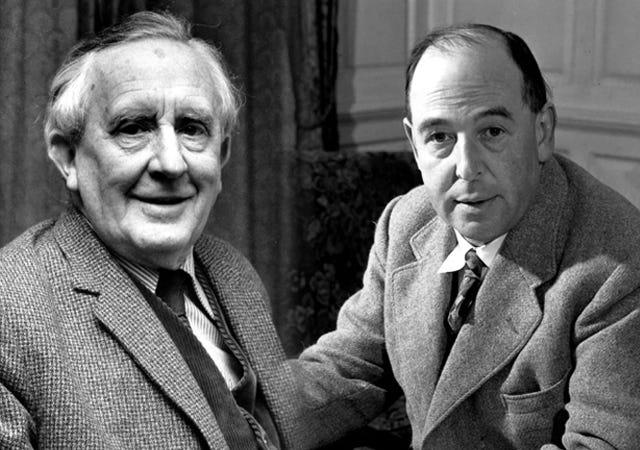C.S. Lewis and J.R.R. Tolkien
Lewis and The Lord of the Rings
Happiest Hobbit Day to you all. September 22 is the birthday of Bilbo and Frodo Baggins. This is indeed a day for The Lord of the Rings, so let’s look at how C.S. Lewis played a role in the story’s completion. We have been given a rich gift by such a wonderous book. I start my annual reading of The Lord of the Rings on this day each year. Would you join me?
C.S. Lewis and J.R.R. Tolkien met at Oxford in the 1920s and swiftly became friends. Their deep friendship was established over the enjoyment of mythology, and they began to meet to read and discuss literature. Tolkien also played a part in Lewis returning to the Christian faith of his boyhood. The 1930s saw a famous deal struck between the two friends as they lamented about the lack of books they enjoyed, thus taking up the task themselves. Lewis would try his hand at a space-travel book (this would become Out of the Silent Planet). Tolkien would try a time-travel book, The Lost Road, which was never completed. His focus would instead turn to The Hobbit.
Before Tolkien’s The Hobbit was released in 1937 to great acclaim, Lewis was reading and encouraging Tolkien in 1932 to finish the book. Lewis’s friendship served as a great influence and encouragement to Tolkien. It reassured him of the value of his stories and that he had something that needed to be heard. Without such a generous friend like Lewis, where would Middle Earth be right now?
Lewis’s main time as “chief midwife” would come during the writing of The Lord of the Rings. What made Lewis’s voice so crucial was that he was first and foremost a fan. Tolkien notes that Lewis was the first besides his son, Christopher, that enjoyed his writings of Middle Earth.
Tolkien recalls Lewis in 1965 in a letter to Dick Plotz, “Thain” of the Tolkien Society in America, “But Lewis was a very impressionable man, and this was abetted by his great generosity and capacity for friendship. The unpayable debt hat I owe to him was not ‘influence’ as it is ordinarily understood, but sheer encouragement. He was for long my only audience. Only from him did I ever get the idea that ‘my stuff’ could be more than a private hobby. But for his interest and unceasing eagerness for more I should never have brought [The Lord of the Rings] to a conclusion.”
While there is some debate as to this encourage and not influence (see Dr. Diana Glyer’s work) Lewis had a hand in bringing forth The Lord of the Rings. He wrote glowing reviews for The Lord of the Rings. These reviews come from the heart of a friend and fan. Lewis wrote to Stanley Unwin (Tolkien’s publisher) in 1953 imploring him on "I would willingly do all in my power to secure for Tolkien's great book the recognition it deserves.”
The years that Lewis read, encouraged, and critiqued The Lord of the Rings can’t be understated. Tolkien labored almost two decades over the book. Lewis was producing his own great literary works throughout this time (Ransom Trilogy, Screwtape Letters, The Great Divorce, most of Narnia, and more), while helping through the labor pains of one of the greatest books in the English language. Lewis was that faithful friend, the opposite of Gimli’s warning (“Faithless is he that says farewell when the road darkens”). Tolkien recognized that faithfulness and amount of work by Lewis in a letter to Stanley Unwin in 1954 on Lewis’s review of The Lord of the Rings, “only by his [C.S. Lewis] support and friendship did I ever struggle to the end of the labour.” It was indeed a labor both for Lewis and Tolkien, but a worthy one.
So, reader today as Frodo and Bilbo celebrate their birthday, let’s be thankful for both Lewis and Tolkien and that we have such a magnificent book to read over and over again. I’m going to go get started on that “A Long-expected Party.”


